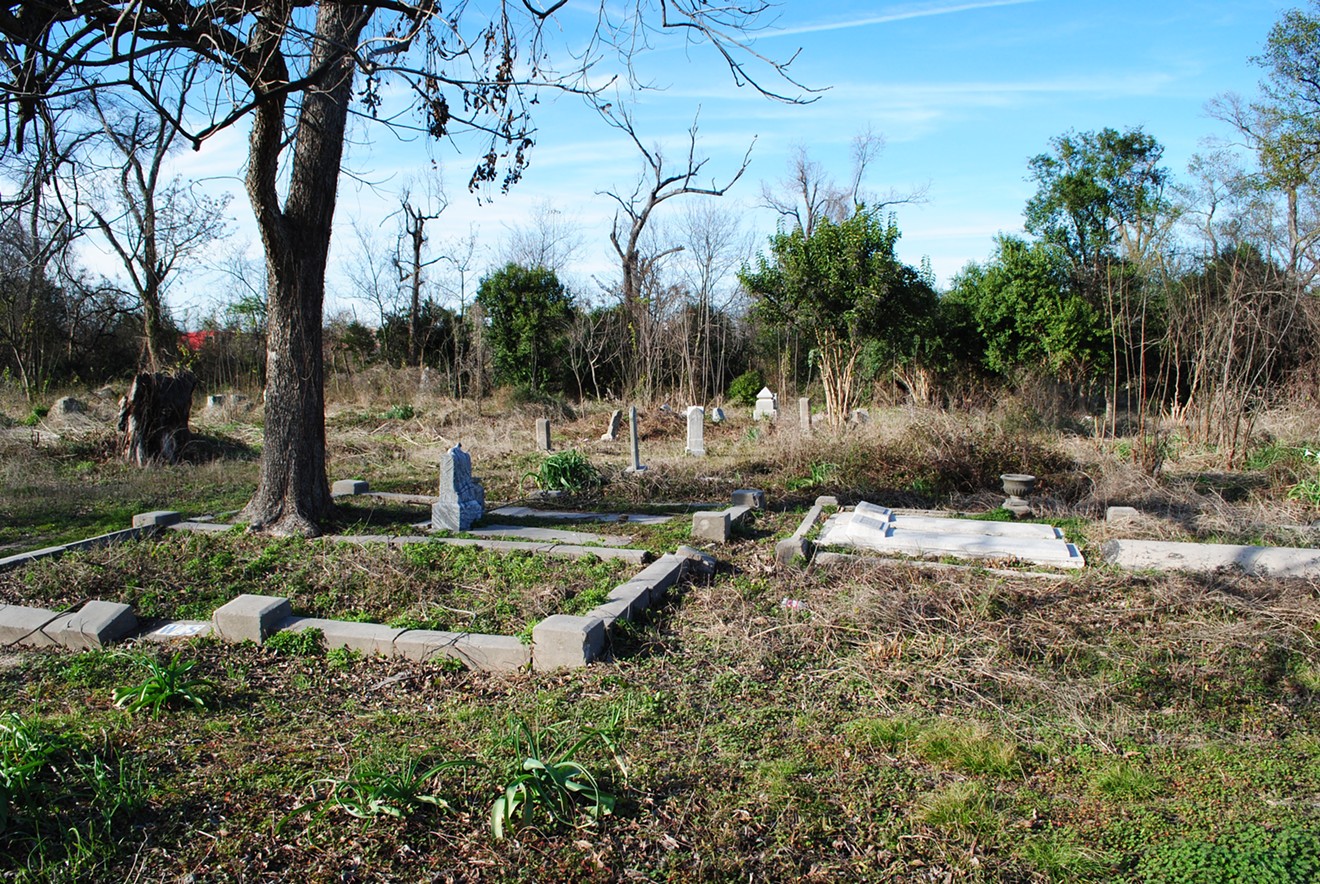I recently got a chance to tour the new History of Cremation exhibit at the Nation Museum of Funeral History. Various urns make up a significant part of the collection. One in particular is eye-catching, set off to the side. It’s an urn that was rescued from the basement of the Service Corporation International building’s basement after Hurricane Harvey flooded Houston. A framed photo of the drowned city under a beautiful blue sky accompanies it.
The urn got me thinking about how cemeteries prepare for hurricanes. Houston has been lucky in 2018 to escape another storm so far, but it is just a matter of time. How will our dead fare?
When there is extensive flooding, caskets can sometimes come right out of the ground. A famous Texas legend that appeared in Ripley’s Believe It or Not in 1929 involves a man named Charles Coghlan, who was buried in Galveston when Isaac’s Storm devastated the island in 1900. The story goes that the famous Irish actor was unearthed from his Texas resting place only for his coffin to travel by ocean 2,000 miles to his original home on Prince Edward Island in Canada.
The legend is probably not actually true, but coffins do get unearthed in flooding. Sometimes they can travel miles. That happened in Orange after Harvey. More than 20 caskets came rising out of the graveyard soil, and some of them floated away. One of the graves damaged was that of blues icon Clarence "Gatemouth" Brown. His monument was cracked and casket dislodged, though luckily he did not float away.
It has to do with the nature of coffins. Modern coffins are airtight. They might be buried in cement sleeves weighing more than 3,000 pounds, but air pressure from floodwaters can pop the lids right off despite the mass.
“People don't understand, once that seal is broke, water's goin’ to get in that box,” says Marvin Edwards said, a caretaker Hollywood Cemetery in Orange. “And it's goin’ to pop. I don't care what you do.”
There is unfortunately little that the city can do to prepare for the possibility of wayward coffins in flood waters. Once they are out of the ground it becomes a matter of finding and identifying the remains.
That’s where the DMORT (Disaster Mortuary Operational Response Team) teams come in. These mobile mortuaries get called out by FEMA to help with the dead following disasters. They’re an often-overlooked part of post-hurricane recovery that helps relocate the dead where they’re supposed to be. The National Center for Preservation Technology and Training recommends that local cemeteries connect with DMORT before storms hit in order to determine the best way for them to proceed in the area should the worst occur.
The most likely damage done is to the grounds and facilities. Flood waters aren’t just water. They often carry debris, sewage, toxic waste and salt that can seriously wreck monuments and other parts of graveyards. Gas and electric lines for lights needs to be considered. It’s easy to think of a cemetery as a static place with few needs, but it’s just not that simple.
The NCPTT recommends that both active and historic cemeteries make regular checklists of storm prep. Record keeping is most important, and files should be digitized if at all possible. Historic cemeteries, often staffed by volunteers, often don’t have the money for projects like that despite the need. That can lead to scrambles to preserve information.
“One cemetery I’ve worked with, they had in their protocol for disaster — they were in a hurricane-prone area,” says Jason Church, NCPTT material conservator. “If they knew it was hurricane season, there was an imminent hurricane coming, what they would do is pack up all of their records, seal the file cabinets. Then the file cabinets got transported to a trailer that was already stored on site, ready. This went to a vehicle. The vehicle then took it to another city six or eight hours inland who already knew about this, the plan was already worked out, and it goes into an internal storage facility once it gets to that municipal government office eight hours inland. So they had sort of thought about this. They were very proactive.”
Erosion plays havoc on the cemeteries as well. Olivewood in Houston along White Oak Bayou is particularly vulnerable. The cemetery is the resting place of many former slaves, and erosion threatens to dump them in the water.
“This is what haunts me,” said caretaker Charles Cook to the Dallas Morning News after Harvey, motioning to a tilted stone marker. “If it keeps eroding, this is my next casualty, a World War I veteran, so I cry every time I come out here.”
It’s not just humans that have to worry. The Little Bit of Heaven Pet Cemetery has been lucky throughout its history says owner John Bailliet. The little garden for Houstonians’ lost pets has never flooded, though he acknowledged that since the tiny coffins often lack cement sleeves they would likely be more likely to float off if one occurred. The facility, including the columbarium for urns, is locked down securely every time a storm is on the horizon.
So far our city has managed to keep its dead safe and at peace when hurricanes threaten thanks to luck, preparation and government resources. The focus when disaster strikes is the living, but just in case flood waters send coffins out of the ground there are ways to make such a thing as painless to clean up as possible.
Support Us
Houston's independent source of
local news and culture
account
- Welcome,
Insider - Login
- My Account
- My Newsletters
- Contribute
- Contact Us
- Sign out

Olivewood Cemetery in 2013
Photo by Patrick Feller via Flickr
[
{
"name": "Related Stories / Support Us Combo",
"component": "11591218",
"insertPoint": "4",
"requiredCountToDisplay": "4"
},{
"name": "Air - Billboard - Inline Content",
"component": "11591214",
"insertPoint": "2/3",
"requiredCountToDisplay": "7"
},{
"name": "R1 - Beta - Mobile Only",
"component": "12287027",
"insertPoint": "8",
"requiredCountToDisplay": "8"
},{
"name": "Air - MediumRectangle - Inline Content - Mobile Display Size 2",
"component": "11591215",
"insertPoint": "12",
"requiredCountToDisplay": "12"
},{
"name": "Air - MediumRectangle - Inline Content - Mobile Display Size 2",
"component": "11591215",
"insertPoint": "4th",
"startingPoint": "16",
"requiredCountToDisplay": "12"
}
,{
"name": "RevContent - In Article",
"component": "12527128",
"insertPoint": "3/5",
"requiredCountToDisplay": "5"
}
]
KEEP THE HOUSTON PRESS FREE...
Since we started the Houston Press, it has been defined as the free, independent voice of Houston, and we'd like to keep it that way. With local media under siege, it's more important than ever for us to rally support behind funding our local journalism. You can help by participating in our "I Support" program, allowing us to keep offering readers access to our incisive coverage of local news, food and culture with no paywalls.
Jef Rouner (not cis, he/him) is a contributing writer who covers politics, pop culture, social justice, video games, and online behavior. He is often a professional annoyance to the ignorant and hurtful.
Contact:
Jef Rouner
Trending News
- Houston Texans Reveal Long Awaited New Uniforms
- Four Reasons the Astros Are Bad at Baseball Right Now
- Texas Rep. Lacey Hull Securing the Vice Chairmanship of GOP Caucus Means What?
-
Sponsored Content From: [%sponsoredBy%]
[%title%]

Don't Miss Out
SIGN UP for the latest
news, free stuff and more!
Become a member to support the independent voice of Houston
and help keep the future of the Houston Press FREE
Use of this website constitutes acceptance of our
terms of use,
our cookies policy, and our
privacy policy
The Houston Press may earn a portion of sales from products & services purchased through links on our site from our
affiliate partners.
©2024
Houston Press, LP. All rights reserved.





